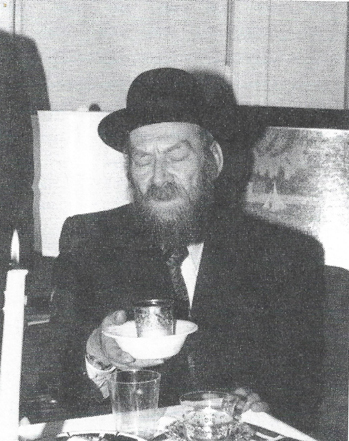
Rabbi Yisrael Mendel Kaplan
Rabbi Yisrael Mendel Kaplan was one of the most gifted Roshei Yeshiva and Torah educators of his time as well as an outstanding mussar personality. He served as a bridge between the "old" world of the Lithuanian Yeshivas and the "new" world of post-war American Yeshivas.(as known, there was a precipitous drop in the caliber of torah scholarship after WWII. I once heard from Rabbi Nachman Bulman zt'l: "I remember as a young boy in New York that in every single shtiblach (small synagogue) there were baalei batim (simple working men) that were big lamdanim (deep scholars) in kol hashas kulo (the entire talmud)" end quote. Today even among full time kollel students, there are very few such lamdanim).
Background
 Reb Mendel was born in Baranovich, Poland (now Baranavichy, Belarus) to Avraham and Esther Kaplan. Avraham was a lawyer and Esther was involved in community service, raising funds for the yeshiva and feeding the poor.
Reb Mendel was born in Baranovich, Poland (now Baranavichy, Belarus) to Avraham and Esther Kaplan. Avraham was a lawyer and Esther was involved in community service, raising funds for the yeshiva and feeding the poor.After his bar mitzva, he was enrolled in the yeshiva of Rabbi Elchonon Wasserman in Baranovich, Poland. He was considered a very promising student and was assigned Rabbi Wasserman's son, Naftali, as a study partner. He later studied in the Mir yeshiva as well. When Rabbi Wasserman needed to travel overseas in order to raise money for the yeshiva, Reb Mendel would deliver the highest talmudic lecture in his place.
While studying in Mir, he married Sarah Baila Gutman, the daughter of Rabbi Tzvi Hirsch Gutman, the administrator (menahel) of the yeshiva in Baranovitch. When Rabbi Gutman was looking for a match, he asked Rabbi Elchonon Wasserman about a number of prospects. Rabbi Wasserman recommended Reb Mendel. When Rabbi Gutman pressed him "Isn't your own son, Naftoli, a little better?" Rabbi Wasserman answered "My Naftoli is a good boy, but he doesn't measure up to Mendel." (Greenwald 1995:31)
After the engagement, Reb Mendel returned to his studies at the Mir yeshiva. During the year and a half they were engaged he interrupted his studies only once to visit her. She had been ill for several days and then one day there was a knock on the door. R.Tzvi Hirsch opened the door and was surprised to find Reb Mendel standing before him. "How did you know my daughter is sick?" He asked. "I didn't. I don't know why I came, but I had a strong feeling that I was needed here so I came" (Greenwald 1995:32).
When WWII broke out the Mir Yeshiva fled for their lives from the Nazi invaders and eventually found sanctuary in Shanghai, China through a complex chain of events. It was the only European Yeshiva to survive WWII intact.
The Kaplan family boarded the trains with other refugees from the Mir Yeshiva despite being without proper visas. After entering Japanese territory by boat, R.Kaplan expected deportation back to Russia and eventually Siberia. Japanese officials goaded him to produce any kind of visa, and he reluctantly showed them an obviously tampered Japanese transit visa. Inexplicably, it was stamped and accepted and the family continued on to Kobe and then later to Shanghai.
Immigration to America
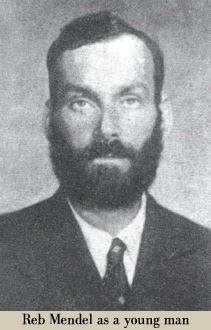 After the war, he moved to America and served as a talmudic teacher in Chicago. Many of those who were to become the leaders of Orthodox American Jewry were his students.
After the war, he moved to America and served as a talmudic teacher in Chicago. Many of those who were to become the leaders of Orthodox American Jewry were his students.Eventually he moved to the Philadelphia yeshiva and taught the same level until his death on April 4, 1985. Rabbi Yaakov Kamenetsky commented "Ahzah Kuntz, (What a feat!) He is greater than famous Roshei Yeshiva, and he can still work quietly under younger men." (Greenwald 1995:48-49)
Although he initially could not speak a word of english, but nevertheless Reb Mendel had a mesmerizing effect on the American students and he earned their respect. Reb Mendel was a masterful personality. He was completely unpretentious and natural in every way and had a deep and profound grasp of people (and himself). He always seemed calm and composed. A slight smile fixed at the edge of his lips expressed an inner tranquility - a tranquility experienced by anyone who encountered him (his family testified that he always kept his composure even in the most difficult times of his life).
As one former student recalls: "when you walked into a room where Reb Mendel was, you immediately felt relaxed. When you came to him with a problem, your problem started to melt away as soon as you saw him".
Reb Mendel had a unique ability to build up someone. Rabbi Berel Wein said he had never met anyone equal to him in that respect. "He was an incredibly astute person - a master psychologist - and he had a remarkable power over people.. whatever you asked him, his answer always threw you off. He knew how to show just what he wanted of himself, and keep what he wanted hidden. That was his genius." (Greenwald 1995:preface)
I asked Rabbi Yisrael Greenwald, a close student of Reb Mendel who wrote a book on him (called "Reb Mendel and his wisdom", artscroll publication): "do you think it is correct to say he was a hidden tzadik?"
He replied:
Yes. There was a mystical aura around Reb Mendel. On Purim at Philadelphia Yeshiva, they would put signs around each of the rebbeim and roshei yeshiva, relating to an aspect of that rebbi's personality. On Reb Mendel's seat, the sign read "He is one out of 36 (hidden tzadikim)." There was a well known legend at the yeshiva, that Reb Mendel was once seen walking by the train tracks near the yeshiva. There was a pedestrian tunnel underneath the track. It was said that he was once seen to be first standing on one side of the track, and was then immediately seen on the other side of the tracks, despite the fact a train had just passed and he hadn't used the tunnel.
Another amazing story, he blessed a bochur (student) who came to Reb Mendel wearing a new suit, that he should become a chosson (groom) in that suit. Years passed, and he didn't become engaged, and the suit was worn and seldom used, but still hanging in his closet. The night he was about to become engaged, the room was dark (I think he didn't want to wake his room mate) so he just pulled out a random suit to wear on the date. After he went outside, he noticed it was the suit Reb Mendel blessed him he should become a chosson in - which in fact, happened.
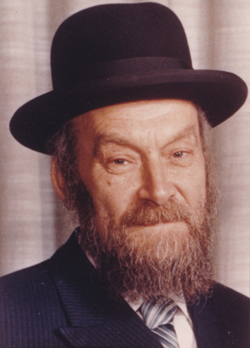
And in his book "Reb Mendel" (pg.213-214), Rabbi Greenwald writes:
Various legends circulated among students at the yeshiva of Reb Mendel's extraordinary abilities. Often his cryptic remarks left all those who knew him filled with wonder. After prayer one sunday morning, Reb Mendel raced over to Mr.Shalom Esrig and told him that his tefilin were not kosher. Mr.Esrig was dumbfounded since his tefilin had just been checked by a sofer (scribe). But he took Reb Mendel's advice and had them checked by another sofer. The second sofer found an error that had been overlooked in the earlier examination...

Avocados and LemonFor a period of time, Reb Mendel was limited to a diet that consisted mainly of avocados and lemons. His grandson Yechiel Mordechai wondered how someone could eat such unappetizing foods. Seeing his grandson's expression, Reb Mendel coaxed him into trying the mixture.
"I hate avocados!" replied the grandson.
"Try it anyway", said Reb Mendel. "If Hash-em made something, you shouldn't say you hate it. Perhaps you could say you dislike something, but not that you hate it".
After much effort, Reb Mendel finally succeeded in convincing his grandson to try the combination, and after tasting some, the grandson admitted that it was not as bad as he had expected.
Reb Mendel commented, "Yes, it's a sophisticated flavor, and in time you'll get to like it." Then he added, "there will come a time that you'll be in a yeshivah far away, and you won't have anything to eat. Then you'll eat avocado and lemon".
At the time, Yechiel Mordechai gave little thought to his grandfather's cryptic remark.
Five years later Yechiel Mordechai was in a yeshiva run by the Lakewood Kollel in Melbourne, Australia. Late one night, he went to the kitchen to look for something to eat. The refrigerator and all the cupboards were bare. As he headed up the stairs to his room, Yechiel Mordechai heard a knock on the door below. Wondering who it could be so late at night, he went down and opened the door to find a member of the community who wanted to give the bachurim some fruits he had left over from a party he had made that evening. Yechiel Mordechai opened the box and found that it contained nothing but avocados. Disappointed, he put it in the refrigerator and went back upstairs.
Five minutes later there was another knock on the door. This time it was a rebbe from the yeshivah who said his children had picked the lemon tree in their backyard that day and wanted to give some to the boys in yeshivah. Yechiel Mordechai had a vague recollection that the two fruits made a good combination, so he sat down and had the late-night snack for which he had been looking. Only after he finished enjoying the avocados with lemon did he remember his grandfather's mysterious remark five years earlier.

Visit in a Dream
Three years after Reb Mendel passed away, a former student decided to leave full-time yeshivah study temporarily in order to complete a torah project he had undertaken. Shortly after starting the project, Reb Mendel appeared to him in a dream and told him, "You must spend more time learning torah".
"Rebbe, please tell me what they're saying about me in Heaven", he pleaded.
At this Reb Mendel simply smiled and said, "these questions you're not allowed to ask". The dream ended and he woke up. The next day he related this dream to Reb Mendel's son and discussed what he should do. In the end, he decided to continue working on the project, but also to learn for several more hours each day.
A few days later, he was in the passenger seat of a car turning left at a busy intersection when an oncoming car crashed into the car he was in. Although the front end of the car was crushed like an accordion, he miraculously suffered only a few fractured bones. Had the collision occurred a mere fraction of a second later, the point of impact would have been just where he was sitting!
Reflecting on this experience, he was grateful for Reb Mendel's warning to increase his merits through torah study, but wondered whether the accident might have been completely averted had he taken the advice more seriously and returned to full time learning. As David HaMelech says of a tzadik: "He protects all his bones, not even one of them was broken" (Tehilim 34:21).
(note: the book author told me this story happened to him. He added: "What is uncanny, is that although I've seen Reb Mendel in a dream numerous times, this is the only time it actually felt 'real'")

Emergency Phone Call
Late one night, the Rebbetzin was sitting in a chair holding an infant grandchild when the telephone rang. As she carried the baby across the room to answer the call, a large chunk of the ceiling came crashing down onto the exact place she had just left! She lifted the receiver to hear Reb Mendel asking anxiously if everything was all right. Astonished, she told him about the miracle that had saved her life that very moment and asked him how he knew he should call just then. Reb Mendel replied that he had fallen asleep and had dreamt that a lion was about to leap out of the ceiling. He awoke from his nightmare and rushed to the telephone to make sure everyone was safe at home.
Reproduced from "Reb Mendel" by Yisrael Greenwald with permission of the copyright holders, ArtScroll / Mesorah Publications, Ltd.
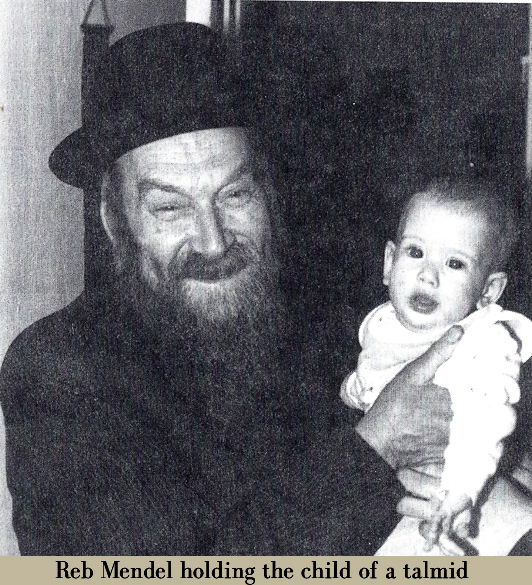
Besides his learning and teaching torah, Reb Mendel was also very involved in doing kindness to others. He loved people and shared in their burdens. When he held a child it was impossible to tell if the child was his own or that of someone else. He also went out of his way to help other people - both Jews and even non-Jews and he possessed a rare ability to make others feel good about themselves. He once said "the greatest good you can do for someone is to hold him in high esteem".
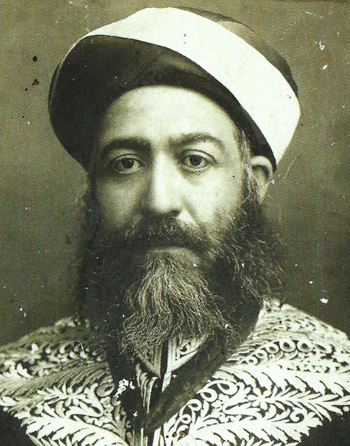 This brings to mind a teaching of Rabbi Chizkiyahu Shabtai zt'l (1862-1955) former Av Beit Din (head of Rabbinical court) of Jerusalem (picture on right):
This brings to mind a teaching of Rabbi Chizkiyahu Shabtai zt'l (1862-1955) former Av Beit Din (head of Rabbinical court) of Jerusalem (picture on right):
Man should love his brother and come to his aid. This means that a Jew must not only help his fellow Jew, but also help non-Jews with whom he should seek a relationship of peace and love.
This is not only intellectually desirable but also required by the Torah, whose 'ways are ways of peace'. The torah commands us not to hate the Egyptians, despite our sufferings in Egypt because we were strangers in their land. In modern times this applies all the more so to people who live freely in their own countries.
Divrei Chizkiyahu p.156-157
For more on Reb Mendel, see the book "Reb Mendel and his wisdom". I once heard from Rabbi Noach Orlowek that this is the best gedolim (great rabbis) book in english.
how to read a newspaper - a former student of R.Kaplan (Berel Wein) describes his first encounter
>> Next Lion from Bavel
Rating: 10 / 10
Total Votes: 3